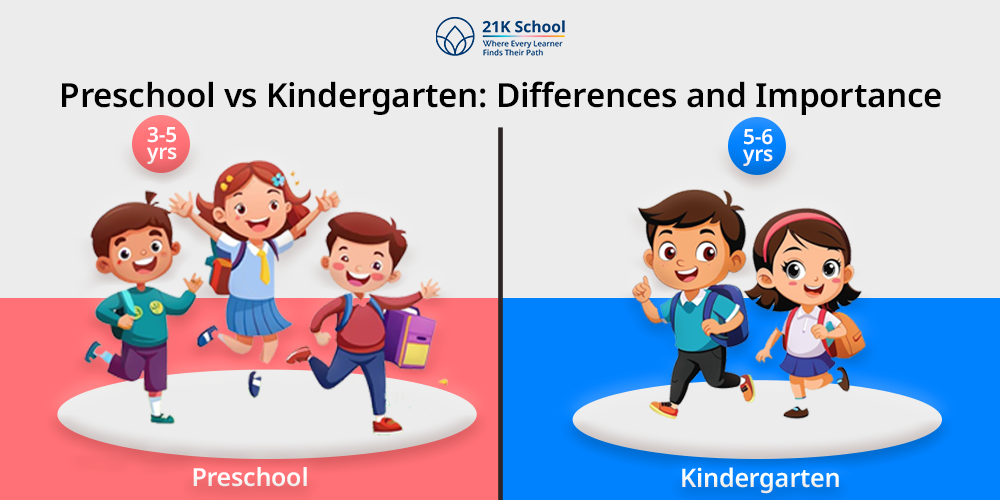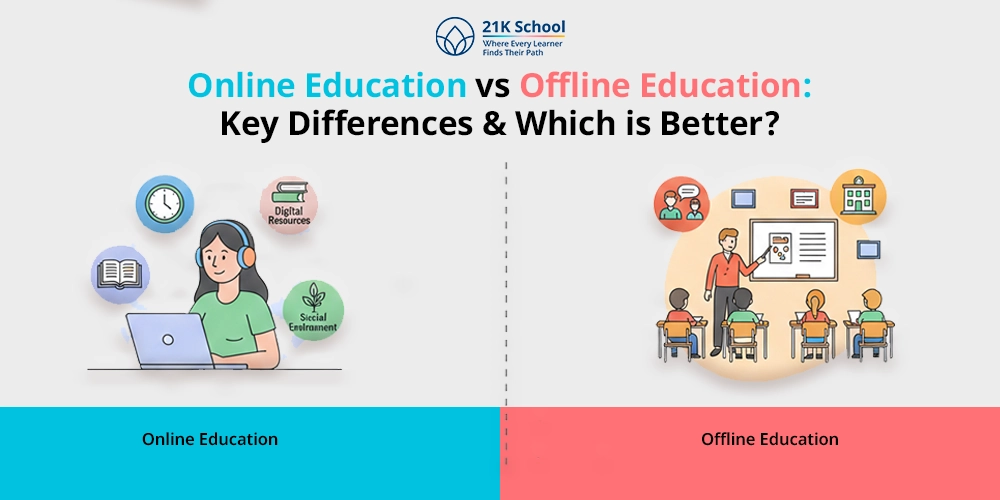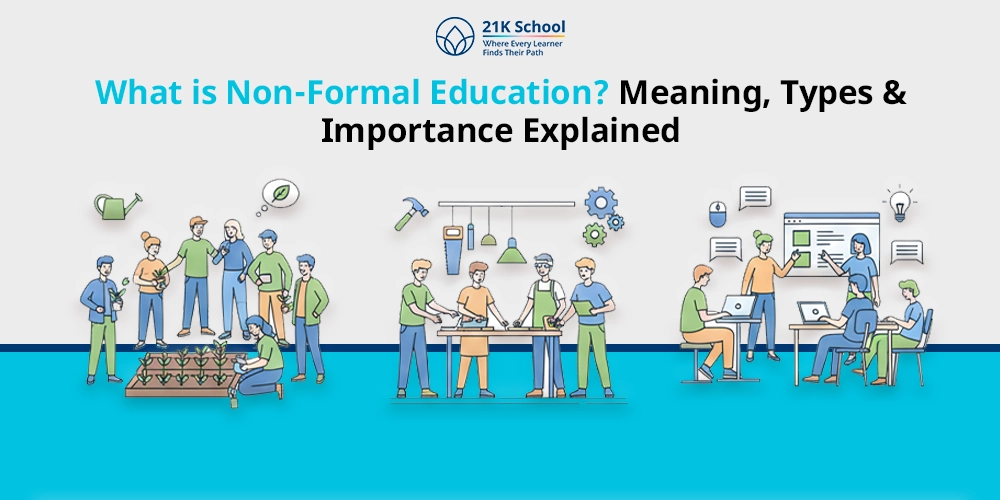
Early childhood education is very important in the development of a child, both in learning and in their behavior. Parents are likely to have a challenge on whether to take their child to preschool, kindergarten or both.
Although some people use the term preschool and kindergarten interchangeably. Still they have various purposes and numerous advantages.
This paper will examine the nature of each, and their advantages. Read on to find how parents can decide which is best to take their children through their academic lives.
Table of Contents
What Is a Preschool?
Preschool is a pre-kindergarten educational institution, which prepares children, whose age is on the average 3-5 years old. It is an introduction to a more organised setting where a child attains elementary social, emotional, cognitive and motor development.
And that too with play-based learning. Here are some homeschooling preschooler activities that are fun and educational .
Preschool education is not mandatory but is viewed as more or less of an optional early educational event. The main purpose is to provide a basis where children would easily move to kindergarten and the rest.
Important Preschool Characteristics:
- Age Range: Age range is usually 3-5, but other programs might recruit even kids as young as 2.
- Emphasis: Socialization, early education (letters, numbers), Mobility, and Emotions.
- Organization: Not so formal as kindergarten. Play-based activities are frequent and some form of learning is also introduced.
- Duration: Calculated based on the program; a half-day and full-day schedule might be used.
- Setting: Less formal, prone to more flexibility, more play and creativity oriented, high level of social interaction.
What is Kindergarten?
Kindergarten is a school based and formal program whereby it is normally offered to children between 5 and 6 years. As compared to preschool, kindergarten is more likely to be the year of formal study, and it is compulsory in most countries.
Kindergarten is structured to enhance the platform of skills acquired in preschool. And to equip children to the higher academic demands in the later schooling.
Important Kindergarten Characteristics:
- Age Range: It is usually applicable to children of 5-6 years old.
- Concentration: Early literacy, numeracy, problem godown, social studies, science and motor skills.
- Design: More academic and serious than preschool but they also have time to play and socialize.
- Duration: Full-day programs, normally, although certain districts will provide half-day programs.
- Setting: A formal classroom setting with instructed children taught by a qualified teacher and based on plan lessons.
Preschool vs Kindergarten: Key Differences
To make the decision between preschool and kindergarten, here is a comparison table highlighting the key differences between preschool and kindergarten:
| Considerable Feature | Preschool | Kindergarten |
| Age Range | 3-5 years | 5-6 years |
| Mendation | Not Mandatory but emphasized for better and early growth | Mandatory in most regions |
| Aim | Social-emotional learning, and basic education skills | Formal academic training including maths, language, and others |
| Structure | Play-based learning, mostly flexible | More structured with formal lessons and tasks |
| Duration | May be half-day or even full-day | Generally a full-day program |
| Teacher credentials | Can be a teacher or an assistant | Qualified teachers |
| Curriculum | Focused on social and emotional skills, with play | Start of reading, writing, maths, and formal chapters. |
1. Age Range:
- Preschool: This group is normally found at the age of 2-5 years.
- Kindergarten: usually children between 5-6 Years.
2. Focus:
- Preschool: Emphasis is on socialization, preliminary capabilities, motor skills and early thinking capacities.
- Kindergarten: Emphasis on academic skills to get children ready to attend formal schools (grade one).
3. Curriculum:
- Preschool: Learning through play, familiarization with simple things (colours, forms, and so on).
- Kindergarten: Greater focus on academic curriculum, reading, writing and math.
4. Learning Approach:
- Preschool: It is a time to explore and play creatively and emotional development.
- Kindergarten: Maximum focus on preparation for school, reading, mathematics, thinking.
5. Teacher’s Role:
- Preschool: Teachers promote social learning, emotionally and help in play.
- Kindergarten: Lessons are more structured and assessments are provided by the teachers to guide academic learning.
6. Daily Structure:
- Preschool: Accessible working conditions in terms of time, usually part-time, and with an emphasis on free-play and discoveries.
- Kindergarten: Full-time program, organized with time routines and schedules, and academic lessons.
7. Assessment:
- Preschool: Children are not formally tested; observation and developmental milestones are used to do assessments.
- Kindergarten: The early stage learning comprises some formal evaluation in reading, math, and behavior.
Advantages of Going Preschool Early
Preschool has proven how it manifests child’s growth in early childhood. Be it in academics, social, physical, or emotional development. Let’s discuss all the benefits that preschool education brings in.
1. Social Development
Preschool exposes children to valuable social skills that include sharing, following instructions, and relating to others. Such experiences will enable the smoother transition to kindergarten.
Read more on benefits of social learning and find why it is emphasized in early education of children.
2. Cognitive Skills
At the level of preschool, a child studies early concepts of literacy and numeracy. Although it is not as advanced as kindergarten.
Kids will have a head start as they might start identifying letters, numbers, and shapes. And therefore preschool helps cognitive development of children .
3. Emotional Growth
Preschool settings also promote emotional development by instructing children on how to respond to their feelings, conflict resolution and self-regulation.
4. Getting used to Group Settings
As preschool is all about group learning, it prepares these children to be used to being in a classroom setting. For the future, easing them into the more rigid environment of kindergarten.
Advantages of Post-Preschool Study in Kindergarten
Kindergarten is the foundation of educational years in the life of a child. And that’s why it is mandatory in several countries. Other than giving basic literacy and academic learnings, it provides other benefits.
1. Academic Foundation
The first legal academic grade in school is kindergarten where children are introduced to read, write, count, and simple arithmetic. Being the pupils of preschool, children are usually in better psychological condition, when learning these concepts.
2. Emotional Readiness
Preschoolers have already acquired some of the essential skills concerning emotions. This enables them to adapt to a formal environment of kindergarten.
3. Building of Independence
Kindergarten will help children develop independence by handling their personal stuff, working on a routine, and doing things independently.
It provides ways to make your child study independently .
4. Social Skills Enhancement
Kindergarten still focuses on social interactions. But on a more scholarly level, giving kids more of a chance to learn cooperative and communication skills.
Preschool or Kindergarten: Tips for Parents
It is often seen that parents are confused if they should send their kids to preschool, or kindergarten, or both. Although it can be a hard decision to make, they can follow a blueprint to decide better.
1. Take a Look at Your Child
In case your child is interested in learning letters and numbers, follow some simple directions. And if he likes to interact with other children, you should consider sending them to preschool.
But in case they are self-sufficient and prepared to learn in an academic form, kindergarten can be the preferred option.
2. Investigate the local possibilities
Not every preschool and kindergarten is identical. Look at schools or discuss with other parents about the educational philosophy, teacher qualifications, and overall environment.
And see what suits your child best.
3. Consider Socialization
When a child is shy or fails to adapt easily to new surroundings a year in pre-school may give them the social skills. This would provide the poise they require to enter kindergarten.
4. See State or Regional Requirements
Where you live kindergarten is required, and your child may have to begin at 5 years old. Look at the local regulations to find out what the requirements are in your region.
5. Family Schedule and Needs
Preschool programs can be on a part-time basis and this could support the flexibility of the parents who require some. Not just that, Kindergarten classes tend to be full day.
So look at your family schedule and whether your child can manage the long school day.
Conclusion: Find out The Best
Preschool and kindergarten can be described as useful steps in the life of the child, but they take different purposes. Preschool emphasizes social, emotional and raw cognitive ability training in a less structured setting.
Whereas kindergarten prepares the youngster at nominal schooling with prioritization on scholastic education and self-dependence.
The preschool or kindergarten decision relies on several factors. Either it is a developmental phase of your kid or their social skills or even the education system in the area.
You need to have a careful thought of these factors. And then you can make sure that you offer your child the most at the start of their educational journey.



